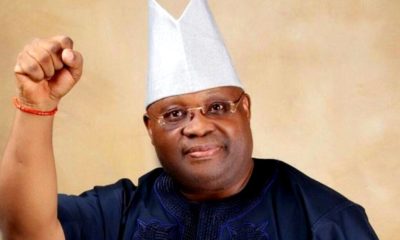Energy
NCDMB Parleys Chevron, Recommits To Fast-Track Approvals of Oil Industry Projects
The Nigerian Content Development and Monitoring Board (NCDMB) has restated its commitment to accelerated approvals of requests and documents submitted to it by operating oil and gas companies.
The goal, according a statement from the NCDMB was to ensure speedy development of oil and gas projects and contribute to increased oil production and improved national economy.
Biztellers reports that Executive Secretary NCDMB, Engr. Felix Omatsola Ogbe gave the assurance on Friday at the Nigerian Content Tower, Yenagoa, Bayelsa State when he received senior officials from Chevron Nigeria Limited led by the Deputy Managing Director, Cosmas Iwueze.
The ES conveyed the Board’s willingness to improve on the timelines set by the Service Level Agreement (SLA) instituted by the Board, Nigerian National Petroleum Company Ltd (NNPC Ltd) and international oil companies for shortening the contracting cycle for oil and gas projects.
He reiterated his proposal for the setting up of technical working groups (TWGs) between the representatives of the NCDMB and respective international oil firms.
The working groups could meet monthly or quarterly to evaluate the companies’ expectations from the NCDMB on their projects. The intent, he explained is “to resolve contentious issues, close all the gaps and come to an agreement before the official correspondences are received. That will ensure quick turn-around and approvals will be dealt with quickly and that will help to cut downtime.”
Emphasising the need for all oil and gas companies to comply with the provisions of the Nigerian Oil and Gas Industry Content Development (NOGICD) Act, the ES promised that the Board will accede to cogent urgent requests from companies to avoid delays that could cause costs overruns, impact negatively on oil and gas operations and the economy at large.
He encouraged the companies to see the NCDMB as partners in progress, adding: “we want to create the enabling environment that will minimize conflicts with international oil companies (IOCs) and attract investments into the sector.
“We want to create employment opportunities for our youths and help achieve the economic objectives of President Bola Tinubu. We want to make international oil companies comfortable and reverse the exit of foreign investors because they create jobs, and we need all hands on the deck.”
Ogbe revealed that he had long and successful career with Chevron Nigeria and remarked that the hallmark of the company was teamwork.
He noted that the NCDMB operates with the same core value, hence the Board is determined to support oil companies to accomplish their operational goals. “We have to make sure that you succeed otherwise we will not be successful,” he added.
The ES confirmed that NCDMB under his watch would not emphasise the use of sanctions, rather would seek to dialogue with companies to achieve win-win situations.
“We will be flexible regarding your requests, but we all need to have open minds and look at the critical paths that will ensure that we make progress and produce effectively,” he said.
Contributing, the Director, Planning Research and Statistics, NCDMB, Isaac Yalah, commended Chevron Nigeria for supporting the Board’s development of the Nigerian Content Research Centre of Excellence at the Federal University of Technology Akure (FUTA), in Ondo State.
He affirmed that the Board will continue to collaborate with Chevron on other projects and would address any issues relating to requests for expatriate quota approvals.
Responding, Iwunze commended the ES for adopting the mantra of collaboration and pushing to increase crude oil production in Nigeria.
He highlighted the importance producing crude oil at competitive costs, noting that the primary aspiration of oil companies and the Federal Government is to ramp up Nigeria’s crude oil production volumes and shore up the revenue accruing to the national coffers.
The Deputy Managing Director emphasised the need to incentivise investments in the oil and gas sector. He explained that international oil and gas companies in Nigeria compete for capital with their sister operations in other oil producing nations.
He said, “The capital we need for big oil and gas investments is domiciled with global investors. We need to always present Nigeria as an investor friendly destination where people can come and do business.”
He also confirmed that the company was working on some major projects, relating to deepwater and Escravos gas-to liquids (EGTL) and he looked forward to receiving the Board’s support and collaboration when the projects come for consideration and approvals.
Energy
SNEPCo, Former MD Aiboni Win Energy Times’ Awards

The Shell Nigeria Exploration and Production Company (SNEPCo) has been named Major Oil Company of the Year for last year by a Nigerian publication, Energy Times.
Biztellers reports that this is in recognition of the company’s contributions to deep-water oil and gas development and the industry generally.
Energy Times also awarded the title of Amazon of Nigeria’s Oil Sector for 2024 to Elohor Aiboni, a former Managing Director of SNEPCo now on international assignment in Brunei.
The awards were presented to SNEPCo’s Senior Operations Manager, Bolanle Odunayo-Ojo, who represented the Managing Director, Ronald Adams at a ceremony attended by key stakeholders in the oil and gas sector.
ALSO READ: BREAKING: Again, Dangote Cuts Petrol Price To N835 per Litre
“We are honored to receive the recognitions for the company and our former Managing Director as they underscore our dedication to excellence in the upstream sector,” Bolanle stated. “The modest achievements are result from teamwork and support by our partners, particularly the Nigerian National Petroleum Company Limited and regulatory agencies. The awards encourage us to continue to work together to power progress and innovation in Nigeria’s energy landscape.”
The SNEPCo has been a pioneer in Nigeria’s deep-water oil and gas production since it began production from Bonga in 2005, Nigeria’s first deep-water well. Gas from Bonga is also piped to Nigeria Liquefied Natural Gas Company Limited at Bonny Island. SNEPCo’s operations have led to significant discoveries, including Bonga Southwest in 2001 and Bonga Northwest, which began production on August 5, 2014.
In its award, the Board of Directors of Energy Times pointed to the continuing success of Bonga, notably production of the 1 billionth barrel of oil in February 2023 and the recent Final Investment Decision on the $5 billion Bonga North project.
The award on Aiboni’s highlights a career that has seen her serve in various business and leadership roles within and outside Nigeria. She was appointed Managing Director of SNEPCo in 2021 and led initiatives that deepened operational efficiency, local content development and social investment projects across the six geopolitical zones in the country.
Energy
Shell Commends Oloibiri Lecture Series As Platform For Change

Shell Nigeria Exploration and Production Company Ltd (SNEPCo,) one of the sponsors of the Oloibiri Lecture Series and Energy Forum (OLEF) has commended it as a platform for driving change in Nigeria’s energy sector through the discussions that centre on business performance, cost discipline and process simplification.
“This event is special to the Shell brand, not only because of the nostalgia of Oloibiri but the quality of discourse it has enabled in our sector over the years,” SNEPCO Managing Director Ronald Adams said in a goodwill speech delivered by General Manager, Wells and Geosciences Operations Joe Mordi. He said: “We are grateful to the Society of Petroleum Engineers and our host the Petroleum Technology Development Fund (PTDF) for another successful outing.”
Organised by the Society of Petroleum Engineers (SPE) Nigeria Council, the Oloibiri Lecture Series and Energy Forum began in 1991, in commemoration of the country’s first commercial oil discovery by Shell at Oloibiri, Bayelsa State, in 1956. Ronald said recent developments in the Upstream and Downstream sectors of the energy industry, including the $5-billion final investment decision by Shell in the Bonga North Deepwater project echoed the sentiments around the first oil discovery.
ALSO READ: No Safety Guarantee For Unscheduled Visitors To Benue – Gov Alia
He noted that, “These strides come with a commitment to excellence required of us – for stakeholders, colleagues, our country and indeed, future generations. The theme for this year ‘Driving energy sustainability through technology, policy and supply chain excellence’ reflects this commitment. The future is bright, and we have the opportunity to co-create it.”
Energy
NLNG Improves Nigeria’s Domestic LPG Supply Efficiency

In line with its continuous improvement culture, the Nigeria LNG Limited (NLNG) will be working closely with its stakeholders to improve operational efficiency in its domestic Liquefied Petroleum Gas (DLPG) supply in Nigeria.
According to a statement from its General Manager, External Relations and Sustainable Development, Sophia Horsfall, this was highlighted at an engagement session with stakeholders in Lagos.
It was gathered that the NLNG plans to enhance engagement and improve operational efficiency of its LPG supply through digitalisation of some of its processes which include a new platform designed to streamline regulatory processes, optimise risk management, and enhance the buyer experience. The platform will feature IT-supported relationship management, automated issue resolution, centralised real-time payments, and improved case management systems, ensuring a seamless supply process despite market shifts and external pressures.
ALSO READ: Ifon-Ilobu Crisis: Adeleke Assures Of Quick Restoration Of Peace
Manager, Commercial Contract Management, NLNG, Tolulope Longe, reiterated that the planned improvements will enable and consolidate NLNG’s resolve to delivering 100% of its LPG supply to the Nigerian market.
She said a strategic roadmap was in play to ensure the achievement of NLNG’s longstanding goals of LPG being accessible and available in the country, aligning with its vision of being a globally competitive energy company, improving lives sustainably. She also harped on the significance of these improvement initiatives and the Company’s push for LPG utilisation as a clean energy source alternative to kerosene and other fossil fuels
Longe noted that the Company remained focused on growth and sustainability of the LPG market by continuously enhancing its supply processes in collaboration with offtakers. She stressed NLNG’s commitment to collaborating with stakeholders to maintain pricing stability and long-term market viability. While acknowledging industry concerns, she noted the importance of operational efficiency in meeting market demands.
NLNG aims to strengthen stakeholder engagement and improve market efficiency in the LPG sector through enhanced customer interactions, minimised schedule disruptions, timely confirmations and deliveries, and prioritisation of customers with demonstrable capacity. As it adapts to market realities, NLNG remains committed to driving sustainability and delivering lasting value to Nigerians.





















